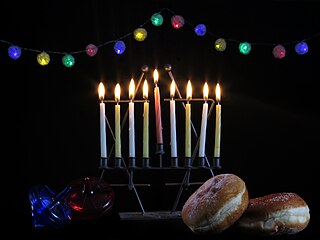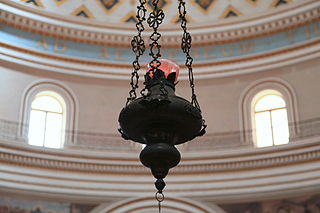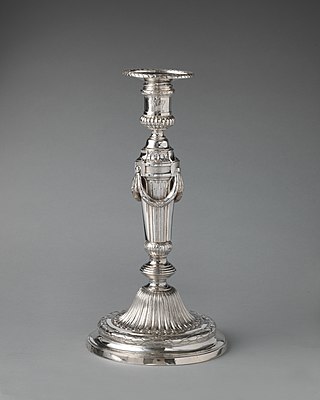Related Research Articles

Hanukkah is a Jewish festival commemorating the recovery of Jerusalem and subsequent rededication of the Second Temple at the beginning of the Maccabean Revolt against the Seleucid Empire in the 2nd century BCE.

Shabbat or the Sabbath, also called Shabbos by Ashkenazim, is Judaism's day of rest on the seventh day of the week—i.e., Saturday. On this day, religious Jews remember the biblical stories describing the creation of the heaven and earth in six days and the redemption from slavery and the Exodus from Egypt, and look forward to a future Messianic Age. Since the Jewish religious calendar counts days from sunset to sunset, Shabbat begins in the evening of what on the civil calendar is Friday.

A sanctuary lamp, chancel lamp, altar lamp, everlasting light, or eternal flame is a light that shines before the altar of sanctuaries in many Jewish and Christian places of worship. Prescribed in Exodus 27:20-21 of the Torah, this icon has taken on different meanings in each of the religions that have adopted it. The passage, which refers to prescriptions for the tabernacle, states:
And thou shalt command the children of Israel, that they bring thee pure oil olive beaten for the light, to cause the lamp to burn always. In the tabernacle of the congregation without the veil, which is before the testimony, Aaron and his sons shall order it from evening to morning before the LORD: it shall be a statute for ever unto their generations on the behalf of the children of Israel. (KJV)

Yom HaZikaron laShoah ve-laG'vurah, known colloquially in Israel and abroad as Yom HaShoah and in English as Holocaust Remembrance Day, or Holocaust Day, is observed as Israel's day of commemoration for the approximately six million Jews murdered in the Holocaust by Nazi Germany and its collaborators, and for the Jewish resistance in that period. In Israel, it is a national memorial day. The first official commemorations took place in 1951, and the observance of the day was anchored in a law passed by the Knesset in 1959. It is held on the 27th of Nisan, unless the 27th would be adjacent to the Jewish Sabbath, in which case the date is shifted by a day.
Havdalah is a Jewish religious ceremony that marks the symbolic end of Shabbat and ushers in the new week. The ritual involves lighting a special candle with several wicks, blessing a cup of wine, and smelling sweet spices. Shabbat ends on Saturday night after the appearance of three stars in the sky. Havdalah may be performed as late as sunset of the Tuesday following Shabbat. Havdalah is also recited at the conclusion of the biblical holidays.

Kiddush, lit. 'sanctification', is a blessing recited over wine or grape juice to sanctify the Shabbat and Jewish holidays. Additionally, the word refers to a small repast held on Shabbat or festival mornings after the prayer services and before the meal.

A candlestick is a device used to hold a candle in place. Candlesticks have a cup or a spike ("pricket") or both to keep the candle in place. Candlesticks are sometimes called "candleholders".

A Mitzvah tank is a vehicle used by the Orthodox Jewish practitioners of Chabad-Lubavitch Hasidism as a portable "educational and outreach center" and "mini-synagogue" to reach out to non-observant and alienated Jews. Mitzvah tanks have been commonplace on the streets of New York City since 1974. Today they are found all over the globe in countries where Chabad is active.

Sefirot, meaning emanations, are the 10 attributes/emanations in Kabbalah, through which Ein Sof reveals itself and continuously creates both the physical realm and the seder hishtalshelut. The term is alternatively transliterated into English as sephirot/sephiroth, singular sefira/sephirah.

A Hanukkah menorah, or hanukkiah, is a nine-branched candelabrum lit during the eight-day Jewish holiday of Hanukkah. Eight of the nine branches hold lights that symbolize the eight nights of the holiday; on each night, one more light is lit than the previous night, until on the final night all eight branches are ignited. The ninth branch holds a candle, called the shamash, which is used to light the other eight.
Hanukkah music contains several songs associated with the festival of Hanukkah.

Rabbi Dovid Kviat was a Rosh Yeshiva in the Mirrer Yeshiva in Brooklyn and the Rabbi of the Agudas Yisroel Synagogue of 18th Avenue.

Bedikat chametz, or bedikas chametz is the Mitzva to search for chametz before the Jewish Holiday of Passover. The search takes place after nightfall on the evening before Pesach.

Shabbat candles are candles lit on Friday evening before sunset to usher in the Jewish Sabbath. Lighting Shabbat candles is a rabbinically mandated law. Candle-lighting is traditionally done by the woman of the household, but every Jew is obligated to either light or ensure that candles are lit on their behalf.

Jewish ceremonial art is objects used by Jews for ritual purposes. Because enhancing a mitzvah by performing it with an especially beautiful object is considered a praiseworthy way of honoring God's commandments, Judaism has a long tradition of commissioning ritual objects from craftsmen and artists.

A yahrzeit candle, also spelled yahrtzeit candle or called a memorial candle, is a type of candle that is lit in memory of the dead in Judaism.

A public menorah is a large menorah displayed publicly during the Jewish holiday of Hanukkah. It is done to celebrate the holiday and publicize the miracle of Hanukkah, and is typically accompanied by a public event during one of the nights of Hanukkah attended by invited dignitaries who are honored with lighting the menorah.
Arich Anpin or Arikh Anpin (Aramaic: אריך אנפין meaning "Long Face/Extended Countenance" (also implying "The Infinitely Patient One", is an aspect of Divine emanation in Kabbalah, identified with the sephirah attribute of Keter, the Divine Will.
"Light One Candle" is a song by the folk group Peter, Paul and Mary. It is a popular Hanukkah song. Peter, Paul, and Mary performed the song in concerts starting in 1982, before recording it for their 1986 studio album No Easy Walk to Freedom.
Rosh Chodesh L'Banot, also known as Chag HaBanot, and in Arabic as Eid al-Banat, is a holiday celebrated by some Jewish communities in the Middle East on Rosh Chodesh of the Jewish month of Tevet, during the Jewish holiday of Chanukah. The Jewish community where the holiday was most preserved is in Tunisia. But there is also evidence that it was also celebrated in Jewish communities in Libya, Algeria, Kushta, Istanbul, Morocco and Thessaloniki.